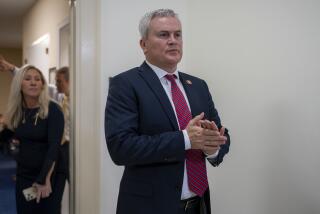Leach Formidable Adversary for Clinton : Whitewater: The GOP lawmaker pushing for hearings on Arkansas real estate venture has a reputation for integrity and independence.
- Share via
WASHINGTON — After years of plaguing the leaders of his own party, maverick Republican Rep. Jim Leach is emerging as one of President Clinton’s most formidable adversaries in the Whitewater controversy.
The 51-year-old Iowa lawmaker demonstrated his resolve this week by pushing ahead with plans to turn a planned House Banking, Finance and Urban Affairs Committee hearing into an inquiry into the Whitewater tangle. He is doing so despite special counsel Robert B. Fiske Jr.’s contention that congressional inquiries could hurt his own investigation into possible criminal violations stemming from Whitewater.
The issues of government integrity and abuse of power involved in the matter are broader than Fiske’s prosecutorial concerns, Leach argued in a letter to Fiske. Earlier, Leach, the ranking Republican on the committee, predicted in a telephone interview that the hearing, tentatively set for March 24, would be of “blockbuster proportions.”
Ostensibly, the hearing is an exercise of the committee’s responsibility for overseeing the Resolution Trust Corp., the agency charged with reviving the scandal-racked and debt-ridden savings and loan industry.
But committee Republicans, spearheaded by Leach, have served notice that they intend to use their time to call a broad roster of people connected with Madison Guaranty Savings & Loan, which is at the heart of the Whitewater controversy, as well as officials of the Clinton Administration who have been linked to the case.
Fiske is looking into allegations that then-Gov. Clinton may have benefited improperly from his association with James B. McDougal, owner of Madison Guaranty and a Clinton partner in an Ozark real estate firm known as Whitewater Development Corp. The inquiry also encompasses the role played by First Lady Hillary Rodham Clinton and the Rose Law Firm, of which she was once a partner, in representing Whitewater and Madison Guaranty.
When he began looking into Whitewater, Leach said, he believed that nothing more serious was involved than a violation of ethical standards and “the spirit of the law.” But now he says: “I am increasingly coming to the conclusion that we have an issue that also relates to the letter of the law.”
Coming from Leach, with his reputation for high-minded and well-informed independence built during 10 terms in the House, such ominous talk is harder for the President and his allies to shrug off than if it had emanated from most other Republicans.
“The reason he (Leach) was able to bring this issue to the front is his high standard of integrity and his expertise in banking,” former Rep. Dave Nagle (D-Iowa) said of his onetime colleague. “Even out here in Iowa where Clinton is doing well at the polls, people said if Jim Leach is looking at Whitewater, he should be heard.”
“The thing that stuck out about Leach was that he wasn’t going to let anybody, even the President of his own party, dictate how he was supposed to represent his own district,” recalled Jim Maddy, executive director of the League of Conservation Voters, who remembered Leach’s opposition to President Ronald Reagan’s environmental policies a decade ago.
Maddy said Clinton aides are making a mistake when they respond to Leach’s comments about Whitewater by accusing him of excessive partisanship. “This is a person of stature and integrity,” he declared.
Leach signaled the independence that would be his hallmark in public life when he resigned from the Foreign Service in 1973 in protest of President Richard Nixon’s firing of Watergate special prosecutor Archibald Cox.
Once in Congress he caused distress for GOP chief executives and congressional leaders by supporting the nuclear freeze, opposing military aid to the Contras in Nicaragua and calling for the resignation of then-Atty. Gen. Edwin Meese III because of the Iran-Contra scandal, in which the Reagan Administration converted proceeds from secret arms sales to Iran to fund the guerrillas.
Paul Begala, the Clinton political adviser who has taken on the task of hitting back at what he calls Leach’s innuendo and “scurrilous rhetoric,” acknowledged that he has been frustrated by Leach’s “Bambi blue eyes and soft-spoken Midwesterner manner,” as well as his reputation for integrity.
“I believe Leach deserves the good reputation he has,” Begala said. “But I think he is putting all that reputation on the line for the proposition that Bill and Hillary Clinton are crooks.”
Leach’s admirers, however, said his concern with Whitewater transcends the fate of the Clintons or any partisan concern and is rooted instead in the reform tradition nurtured in the Upper Midwest.
“He gives you the impression of someone who is concerned about the governing process and the ability of this country to survive,” said Clark Pellett, another Iowa native and now a Republican ward committeeman in Chicago, after hearing Leach speak on Whitewater at a GOP dinner in the Windy City last week.
Pellett said Leach’s 20-minute talk was “very intellectual and scholarly.” During the question period, when asked about Clinton’s own involvement in the affair, Pellett recalled, “he said he had to be very clear there isn’t any allegation whatsoever against the President or the First Lady that has been substantiated.”
Leach himself contends that his current absorption with Whitewater stems naturally from his longstanding concern about the savings and loan industry. He sounded the alarm early and often against the debacle that overtook the industry in the late 1980s.
More to Read
Get the L.A. Times Politics newsletter
Deeply reported insights into legislation, politics and policy from Sacramento, Washington and beyond. In your inbox twice per week.
You may occasionally receive promotional content from the Los Angeles Times.










